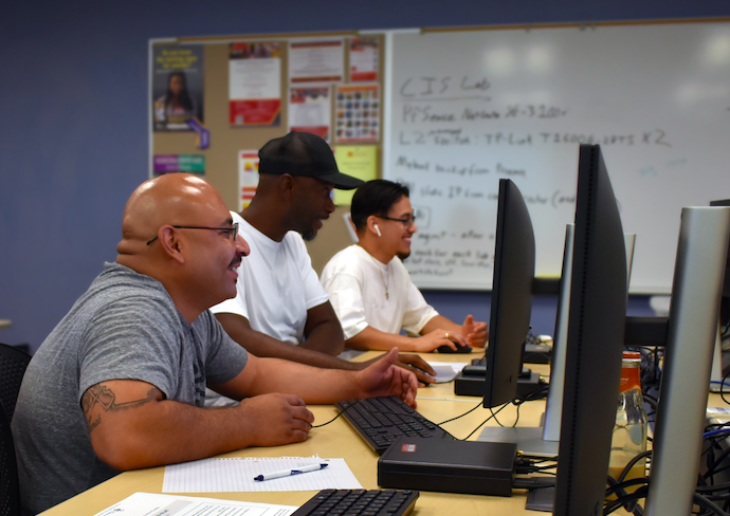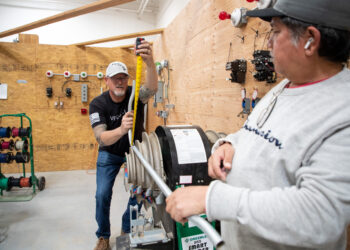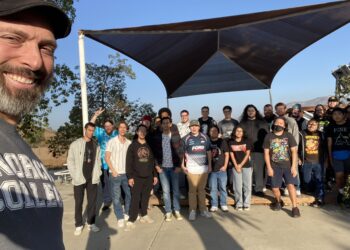Encouraging Real-World Cyber Experience: College of the Desert’s CIS Program Hones in on Hands-On Learning

For Computer Information Systems (CIS) students at College of the Desert, finding a job after graduation is virtually guaranteed. With more than 80,000 cyber-focused positions currently available in California, earning a degree within the in-demand industry is helping students secure a Ready, high-tech career.
The most difficult challenge for students when landing these cyber-careers, explains CIS professor and program spearhead Felix Marhuenda-Donate, is finding the essential field experience. That’s where the CIS program at College of the Desert (COD) shines. The college has partnered with RobertHalf for apprenticeships and created cyber-focused clubs and organizations, including CISGeeks.
“That is always the hard part,” admits the professor. “That’s why we work so hard on CISGeeks and the RobertHalf relationship … Just so that [students] can start getting in the field.”
About five years ago, Professor Marhuenda-Donate was offered the reins for the CIS program at COD. When he took over the program, he was the only full-time faculty member, and courses were at record-low enrollment. From there, he hit the ground running and began writing an associate degree based off lower-division coursework for Cal State San Bernardino’s cybersecurity school.
“That [degree] proved incredibly popular right off the bat,” he explains. “Our enrollment numbers just skyrocketed at first. Then, we started adding things to it, so rather than just being a transfer degree, we added an employment degree … we added Cisco, Amazon Web Services, Linux, computer forensics, ethical hacking, all that fun stuff.”
The integral partnerships and opportunities continuously uplift students with the valuable hands-on experiences they need to launch into a cyber-focused career field.
“We have a partnership now starting this semester with RobertHalf,” Marhuenda-Donate says. The California-based consulting firm is accepting five CIS students to take on a cybersecurity apprenticeship this Spring semester.
“These [apprenticeships] are sanctioned by the state, by the federal government and Department
of Labor … [students] are going to get paid to get that real-world experience, and to apply all that stuff they’re learning in the lab.”
For the CISGeeks program, students are getting the chance to take their tech skills off campus. The mobile computer repair service provides free tech support to people both on the main Palm Desert Campus and in the community.
“We’re pretty much the same thing as the Geek Squad, but it’s all-free services,” Marhuenda-Donate explains.
“This faculty-managed, student-run program has provided an outlet in which the student can provide computer assistance to not only students and faculty at COD, but in some cases even out to the local community,” further explains Mark Rizzo, Laboratory Specialist at COD.
“It is the experience in working with many different people and in problem-solving all types of computer-related issues that is the true payoff.”
Rizzo, a laboratory specialist in the CIS program at the college, is also an alum. More than 21 years ago, the Roadrunner earned his associate degree in CIS, along with a position in the department. For Rizzo, watching the program grow into what it is today has been endlessly motivating.
“In that time, I have seen the growth and change within the program, but none more than what I have seen over the last three-plus years under the management of Professor Felix Marhuenda-Donate and Martin Flores, our Cybersecurity instructor,” shares Rizzo.
“I am so encouraged by what they have done and will continue to do that I am personally going back to school to improve on my education and knowledge as well as add some new skills to my educational toolbox so that I can best help them.”
With a primarily online curriculum, the CIS faculty is adamant about providing a strong community for their students. The COD Cybersecurity Club, called CODIS, meets in person on the Palm Desert campus every Friday. Students take this time to share skills, practice techniques, and train for upcoming cyber-competitions.
“We play with equipment, we’re doing system builds, we’re training for cybersecurity competitions, we do all kinds of fun stuff,” explains Marhuenda-Donate. “It’s our way of bringing them in and having a sense of community, rather than everybody being online and doing their own thing.”
Cybersecurity competitions like CyberPatriot and National Cyber League keep students fresh on the latest cyber defense techniques. These competitions give students a chance to prepare for problems they will most likely face in the cybersecurity field. One critical skill is ethical hacking, which is relevant in almost every industry.
“For you to be able to catch the ‘black hat’ hackers, you have to train like they do,” Marhuenda-Donate explains.
“So that is what we do. We train the ‘white hat’ hackers to catch all these people who are up to no good. And we use the same tools they use. We use not just software, but the social-engineering skills, lockpicking, and that kind of stuff. It’s not part of the curriculum, but it is in an informal way.”
And the CIS program isn’t slowing down any time soon. Marhuenda-Donate constantly adds opportunities for students to get the best educational experience at COD. Even though the program continues to grow, Rizzo says they are already seeing promising student outcomes.
“Several of our successful prior students have gone through our program and have taken their knowledge to the next level,” shares the proud lab specialist.
“They are thriving in both transferring for completion of a four-year Cybersecurity degree and in graduating with a certificate into a suitable job to best serve the needs of the local community.”
For more information about the CIS program at College of the Desert, you can visit their program page here.



